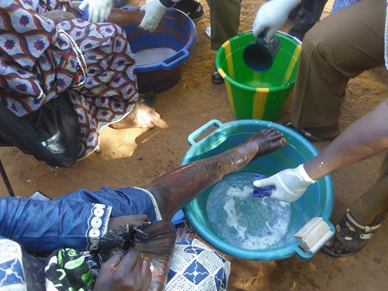ASTMH Annual Meeting 2025
blogSuccess in the Fight Against Lymphatic Filariasis and Lymphedema
By:

By: Eric Ottesen and Sarah Sullivan, Neglected Tropical Diseases Support Center
Lymphatic filariasis (LF)—or elephantiasis—is a neglected parasitic disease, causing major disabilities such as lymphedema (LE) and hydrocele. In their efforts to eliminate LF, public health officials around the globe rely on and have found success using mass drug administration (MDA) to prevent the millions of infections and to alleviate the suffering those affected by this disease. Doxycycline (an oral antibiotic) and local hygiene management have been shown to be effective in slowing the progression of lymphedema.
We set out to compare the effectiveness of one six-week course of doxycycline added to daily hygiene (i.e., washing and elevation of the affected leg) for two years versus daily hygiene alone in LE patients. We conducted three independent, double-blind, placebo controlled clinical trials in Sri Lanka, Mali, and India. More than 200 participants at each site received hygiene kits and were retrained regularly in their use during the study; half also received doxycycline and half received the placebo. Our preliminary findings suggest that nearly all of the patients—about 90%—showed no LE progression and either maintenance or improvement in their quality-of-life measures.
The clinical trial results reinforce the importance of hygiene practices in lymphedema management. The positive outcomes in both patient groups likely resulted from repeated training and close attention to local hygiene—emphasizing the importance of such management in the care of LE patients. The clinical trial was funded by the United States Agency for International Development (USAID) via the Coalition for Operational Research on Neglected Tropical Diseases (COR-NTD). Learn more about the study here. Related sessions and posters include: A double-blind study of 6-week doxycycline or placebo added to limb hygiene in Sri Lankan patients with filarial lymphedema and Doxycycline six weeks courses are acceptable for lymphedema management in Malian rural areas despite a Covid-19 pandemic context.
[about the authors] Eric Ottesen is Advisor to the Director of the NTD Support Center, having served as Director from 2013 to 2019. Sarah Sullivan is the Senior Data Analyst at the NTD Support Center, where she is responsible for the development and management of NTD-SC's open access research data portal.
Related Posts
By: Matthew Davis, Burness